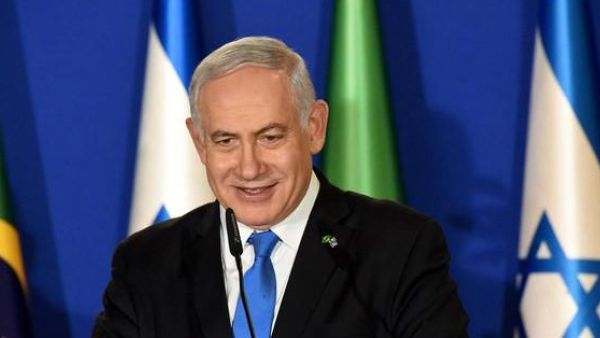Prime Minister Benjamin Netanayhu departed for Moscow Thursday morning for a meeting with President Vladimir Putin that is expected to focus on Syria and Iran.
In a brief statement to the press, the prime minister said he was heading to Moscow for the “periodic meeting” just five days before next Tuesday’s elections.
“We will discuss events in Syria, and are they accumulating, and the regular and special coordination between our armies as well as other important issues for the State of Israel,” Netanyahu said.
The prime minister has boasted of his close personal ties to world leaders, including Putin, during the current election campaign, arguing that his diplomatic skills are unrivaled.
His trip also comes a day after Israel announced it had recovered the remains of Sgt. First Class Zachary Baumel, who was killed in the First Lebanon War’s battle of Sultan Yacoub in 1982 at the age of 21.
Speaking to reporters before he boarded the flight, the prime minister didn’t comment on rumors that Russia had played a role in the return of Baumel’s body. Moscow said in September that it had helped Israel search for the remains of missing soldiers in Islamic State-held territory in Syria.
It wasn’t immediately clear whether Netanyahu would attend the funeral for Baumel on Thursday evening in Jerusalem.
The last meeting between Netanyahu and Putin took place in late February in the Russian capital, and marked their first significant encounter since a major spat developed over a downed Russian spy plane in September. Even though the plane was shot down by Syrian air defense while aiming at an Israeli jet that was targeting an alleged Iranian installation, Moscow blamed Israel, saying the IAF used the Russian aircraft as cover and did not give the Russians proper warning of its planned strike in Syria. Israel denies the charges.
At the time, Netanyahu stressed Israel’s absolute commitment to continue to act to thwart Iran’s efforts to military entrench itself in Syria. Tehran and Damascus are close allies of Moscow.
“The greatest threat to stability and security in the region comes from Iran and its proxies,” Netanyahu told Putin in February 27. “We are determined to continue our aggressive activity against Iran, which calls for our destruction, and against its attempts to establish itself militarily in Syria.”
During the public part of the February meeting, Putin welcomed his Israeli guest, but did not specifically mention Iran or Syria in his remarks. “It is very important that we continue to cooperate. Russia was a supporter of the establishment of Israel. We are happy to talk about the situation in the region and the security issue,” he said.
The matter of the US administration’s recognition last week of Israeli sovereignty over the Golan Heights is also likely to be discussed at Thursday’s meeting. Moscow condemned the decision, reiterating that it considers the territory part of Syria.
Netanyahu had credited his close ties with Putin for the success of a system allowing Israel to carry out strikes in Syria without becoming entangled with Russia, which is allied with Syria’s President Bashar Assad, but those ties reportedly took a hit in the wake of the spy plane incident.
This article has been adapted from its original source.








